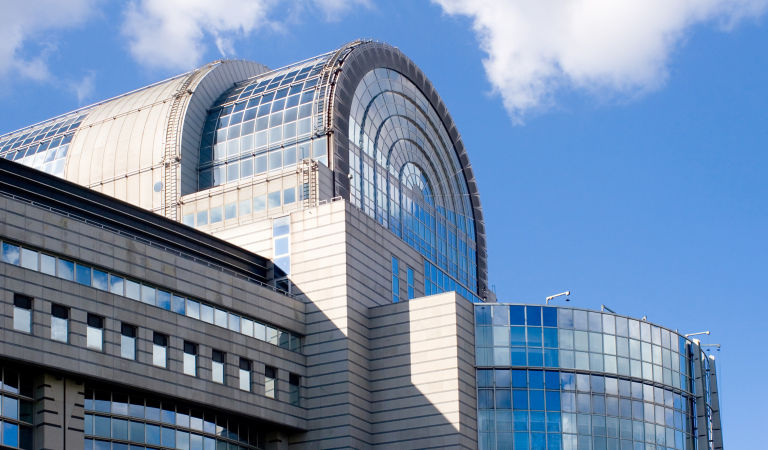The outcome of June’s elections for the European Parliament could accelerate a shift in the European Union’s (EU’s) policy priorities, with potentially meaningful implications for European equities. Below, I explore some of the key themes I am monitoring.
Political pendulum swinging to the right
As anticipated by the polls, the far right appears to be the big winner of the European Parliament elections. While centrist parties have been able to maintain an overall majority, the balance of power is likely to tilt from the centre left to the centre right, with the European People’s Party (EPP) now the most influential parliamentary group. In most cases, I expect the EPP to continue voting with the centre left but it could also build a majority with the far right, which would give the EPP significant leverage when it comes to issues such as immigration, climate and further EU integration. An additional complicating factor is the ongoing political uncertainty in France, which is broadly seen as a negative surprise for European risk assets.
How this reset alters EU policy will depend on a range of factors, including the composition of the European Commission, potentially significant shifts in the political make-up at member state level — most notably in France — and international developments such as the war in Ukraine and the US elections. However, based on my recent conversations with policymakers, future EU policy is likely to be:
- less green — Segments of the electorate think that climate measures have gone too far, especially as the energy affordability crisis has eased somewhat. I think that the EU will maintain its focus on energy independence, but slow down further policy advances towards net zero. In addition, some long-term initiatives — for instance, the production of green hydrogen — may lose momentum.
- less focused on EU integration — The surge in support for extremist parties suggests a growing loss of trust in government institutions among sizeable segments of the European population. Those voters also believe that EU integration is going too fast and worry about national sovereignty, meaning progress in areas such as the capital markets union could slow down even further while new proposals, such as a common defence fund, may struggle to gain momentum.
- tougher on immigration — The recently agreed reform of asylum and migration rules has made it tougher for asylum seekers to enter the EU, but increased pressure from the extreme right could lead to additional tightening. Such a move could further restrict an already tight labour market.
- more pro-business — A common criticism is that the current European Parliament focuses too much on regulation, at the expense of business. We could see efforts to roll back some measures, especially in industries that are important for national security and supply chain resilience, notably semiconductors and critical minerals. We could also see a more permanent easing in state aid rules.
- potentially more China-friendly — The new European Parliament could also turn incrementally more positive on China given the greater influence of extreme right parties. Since the invasion of Ukraine, parts of the European far right have switched their support from Russia to China. An incrementally more pro-China parliament could complicate relations between the EU and the US, as the US continues to push for decoupling.
What does this mean for investors?
While a reduction in the administrative burden could be a clear positive for EU businesses, I view the overall change in direction as marginally negative. Reforms driving further integration such as the banking union and the capital markets union would strengthen the resilience of the EU’s economy and facilitate growth, while allowing and encouraging the immigration of skilled labour could be important to help limit inflation and improve trend growth. The political uncertainty associated with the rise of the extreme right — at both European and national level — may also negatively affect investor sentiment towards European equities. This would be especially the case if the political extremes were to achieve an absolute majority in the upcoming French parliamentary election.
Strong momentum in favour of defence
European policymakers are clearly redirecting their focus from the energy transition to defence given:
- an easing of the energy crisis — While Europe is still pushing for energy independence, the acute stage of the energy availability and affordability crisis is over. This reduction in pressure makes the transition to renewables less urgent in the near term.
- the ongoing Ukraine conflict — A broadening of the war in Ukraine remains a distinct possibility. After years of underspending, Europe is significantly underprepared to defend itself or meaningfully support Ukraine without US assistance.
- a potential Trump 2.0 — A second Trump presidency would significantly increase pressure on European countries to increase military expenditure.
Areas where EU member states wants to work more closely include better coordination and cooperation on large-scale development projects such as next-generation battle tanks and fighter jets, greater alignment of procurement efforts and strengthening Europe’s defence industry to reduce reliance on imports.
Given that defence spending remains a national issue, it remains to be seen whether ideas such as an EU defence commissioner or the common defence fund promoted by EU Commission President Ursula von der Leyen will become a reality. However, in my conversations with policymakers, I have noted a clear willingness to spend more. While the 2% NATO spending target was for a long time considered a ceiling, many EU countries are now treating it as a floor, with Germany and Eastern European countries in particular ramping up their defence budgets.
What does this mean for investors?
I see this growing impetus in European defence spending as a clear positive for European defence companies as they will benefit from both strong tailwinds and better visibility on medium-term demand. Moreover, unlike providers involved in delivering the energy transition, defence contractors are protected by much higher barriers to entry. While valuations have gone up significantly, I think select stocks remain attractive from a longer-term perspective.
A benign fiscal climate
The EU’s new fiscal rules give member states more time to reach fiscal targets and prevent sharp cuts to public spending, especially when linked to structural reforms or investments. The rewritten rules aim to help poorer European countries, which tend to benefit less than the larger economies from the recent easing of state aid rules. In my opinion, the new rules should also help to avoid a repeat of the austerity that followed the global financial crisis.
During our conversations, EU policymakers acknowledged delays in the EU’s post-COVID fiscal programme, NextGenerationEU (NextGenEU). With a large part of the disbursement and implementation still to come, many policymakers expect the programme to be extended beyond 2026. However, they do not anticipate another large issuance of common debt to finance fiscal expenditure in the near term.
What does this mean for investors?
I maintain my view that the fiscal backdrop in Europe will surprise to the upside, especially in the periphery as those member states are the largest beneficiaries of NextGenEU and I expect the programme to have its biggest impact over the next three years. I also draw comfort from the eased fiscal rules as we are unlikely to see unnecessary cuts to public spending. Both the upcoming NextGenEU expenditure and the less stringent fiscal rules should favour stocks exposed to European domestic demand.
All eyes on the US elections
From an EU perspective, a democract (likely Harris) presidency is significantly more straightforward than a Trump victory, which could lead to a range of adverse outcomes including tariffs on European products, further decoupling between the US and Europe on how to approach relations with China, less coordination on climate change and less cooperation/coordination on defence. A second Trump presidency could also give “EU dissenters” such as Hungarian Prime Minister Viktor Orbán and Polish President Andrzej Duda a bigger platform.
What does this mean for investors?
The path the EU will take in the event of a Trump presidency is unclear but, from my perspective, is likely to involve reducing the EU’s vulnerability in areas such as defence and the energy transition while seeking to mitigate the risks associated with the inherent unpredictability of an isolationist and transactional administration. This scenario should benefit defence stocks but could pose risk for many international European companies that benefit from global supply chains and limited tariffs.
Overall, an improving backdrop
In the near term, Europe is facing heightened political risk. However, with the critical caveat that the French government does not move too far to a political extreme that could result in investors questioning again the eurozone’s sustainability, I remain positive on European equities. An improving growth backdrop and strong fiscal support provide an attractive environment for European banks and beneficiaries of domestic consumption such as travel and leisure. I also like defence from a cyclical perspective and health care, telecoms and utilities from a more defensive standpoint.
More broadly, the recent strong performance of European equity markets (ahead of the European elections) suggests that global investors have started to re-engage with European equities on the back of the burgeoning recovery in European growth and the concentration risk in the US market. While the political uncertainty has resulted in a reversal, I believe this is temporary and that the positive underlying trend for European equities has still further to run. However, I think that active differentiation is becoming more important given the rapid rise in valuations in certain pockets of the market.

























